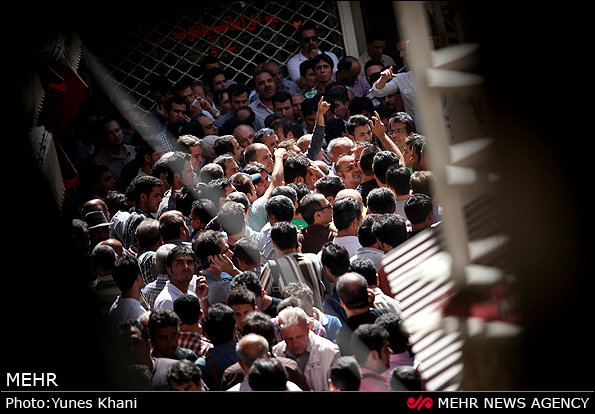Iran Feature: The Political Propaganda Around An Analysis --- "Economy Is Not on the Verge of Collapse"
 Tehran Currency Market, 2 Oct 2012A very interesting media development, as Khabar Online uses its English-language website in an attempt to give the "right" view of the currency crisis....
Tehran Currency Market, 2 Oct 2012A very interesting media development, as Khabar Online uses its English-language website in an attempt to give the "right" view of the currency crisis....
The website reprints an article, originally published by the American site LobeLog, in which US-based economist Djavad Salehi-Isfahani pronounces, "Understanding the Rial's Freefall: Iran’s Economy is Not on the Verge of Collapse".
Salehi-Isfahani is a prominent analyst, but this piece should be read more as a political intervention than as an accurate critique of the economic situation.
There are irrelevant diversions, which have little to do with the Iranian situation: "What all the related excitement overshadows is that this devaluation is not comparable to those in other countries where large devaluations caused severe shocks to the economy, such as those that swept through Asia in 1997-98."
There are contradictions. Salehi-Isfahani asserts, "The rial devaluation...is actually taking place in a narrow market that is shrinking in size and diminishing in importance." In the next paragraph, however, he writes that the catalyst for the crisis was currency for "the import of non-essential but important commodities, which account for about two-thirds of Iran’s imports" --- not exactly a "narrow market".
There is sweeping, unsupported assertion. After (correctly) detailing the effect of the Central Bank's ill-fated attempt to set up a "trade room" with a small discount for foreign exchange, Salehi-Isfahani brushes away the significance: "Most of the economy is shielded from this exchange rate, though not from the ill effects of the sanctions." One glance at Thomas Erdbrink's first-hand report from Tehran, featured on EA today and supported by numerous accounts we have received over the last year, would dispel the idea that the Iranian people are "shielded" from the fall of the Rial.
And finally, in the last paragraph, there is an admission that approaches the heart of the matter:
The government can ill afford to ignore millions of Iranians, mostly upper income Iranians, who are affected by the gyrations of the parallel market. Among them are millions of people who are seeking a safe place for their savings, parents who send money to their children for education abroad or need to travel there to see them. They are not all importers of luxury items or those who want to take their money out of Iran. In allocating its limited --- perhaps shrinking supply of for foreign currency --- the government has a difficult time balancing the needs of the lower middle class and the poor with those of upper income Iranians that it cannot rely on for political support.
Approaches the heart of the matter, but not quite. Notice Salehi-Isfahani's implication --- the "lower middle class and the poor" are not suffering the effects of the economic situation, because supposedly their "needs" are met by the regime. It is only the "upper middle class" who are frustrated and angry.
That is close to the political narrative, fed by the regime and its supporters on a daily basis, that it was largely the "upper middle class" --- often put in shorthand as the privileged residents of north Tehran --- who disputed the outcome of the 2009 Presidential election and who contributed to "sedition" with their protests. In contrast, the majority of the "lower middle class and the poor" support the regime and will continue to do so.
Salehi-Isfahani may not intend to take this path, but the politics of his piece means that others will do so. I suspect LobeLog was moved to highlight this piece, for example, because of its opposition to sanctions and the belief that they will push the Islamic Republic into concessions on its nuclear programme --- thus while Salehi-Isfahani says it is the "ill effects of the sanctions" rather than the Government's mismanagement that cause the most damage, he follows up, "Would it cause sufficient economic pain that would push the Iranian government to make concessions in its nuclear standoff with the West? The answer is not likely."
For Khabar Online, the political pay-off is an assurance to the English-reading world that all is not so bad in Iran.
Indeed, that assurance is part of a paradox. For while Khabar is trying to tell outsiders that there is no crisis --- not only in Salehi-Isfahani's analysis but in every other article in its its Economy section --- its Farsi-language site has been sharply critical of the Government and the economic situation, albeit within the limits of what information is permitted by the regime.
And Khabar's patron, Speaker of Parliament Ali Larijani, was not issuing reassurances this week. To the contrary --- and in contrast to Salehi-Isfahani --- he was pointedly declaring that economic problems were only 20% due to sanctions and 80% due to the mistakes of the Ahmadinejad Government.
That is, Larijani was declaring this up to Wednesday when, for an unexpected reason, he suddenly cancelled a press conference.
After all, when your main Bazaar is closed and your Rial-to-Dollar foreign exchange is suspended, and people who are not necessarily "upper middle class" dare to express their anger, the regime would prefer someone to say "Iran's Economy is Not on the Verge of Collapse".

 Friday, October 5, 2012 at 9:31
Friday, October 5, 2012 at 9:31
Reader Comments